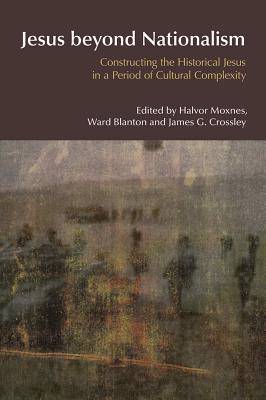
Door een staking bij bpost kan je online bestelling op dit moment iets langer onderweg zijn dan voorzien. Dringend iets nodig? Onze winkels ontvangen jou met open armen!
- Afhalen na 1 uur in een winkel met voorraad
- Gratis thuislevering in België vanaf € 30
- Ruim aanbod met 7 miljoen producten
Door een staking bij bpost kan je online bestelling op dit moment iets langer onderweg zijn dan voorzien. Dringend iets nodig? Onze winkels ontvangen jou met open armen!
- Afhalen na 1 uur in een winkel met voorraad
- Gratis thuislevering in België vanaf € 30
- Ruim aanbod met 7 miljoen producten
Zoeken
Jesus Beyond Nationalism
Constructing the Historical Jesus in a Period of Cultural Complexity
Halvor Moxnes, Ward Blanton, James G Crossley
€ 182,45
+ 364 punten
Uitvoering
Omschrijving
The study of Jesus has rarely looked at its own scholarly context, at how the representation of Jesus might be shaped by those who study him. 'Jesus beyond Nationalism' examines how - since the beginnings of historical Jesus studies in the nineteenth century - representations of Jesus have been used to promote hegemonic or mono-cultural views. The ideology behind such representation has operated to deny difference in society, difference in terms of race, ethnicity, gender, and sexuality. Examining depictions of Jesus in a range of contexts - from the Russian Christ and Jesus as 'Holy Anarchist' to Jesus in Muslim thought - Jesus Beyond Nationalism reveals the politics behind the ways in which Jesus has been constructed and presented.
Specificaties
Betrokkenen
- Auteur(s):
- Uitgeverij:
Inhoud
- Aantal bladzijden:
- 256
- Taal:
- Engels
- Reeks:
Eigenschappen
- Productcode (EAN):
- 9781845534103
- Verschijningsdatum:
- 1/12/2009
- Uitvoering:
- Hardcover
- Formaat:
- Genaaid
- Afmetingen:
- 156 mm x 233 mm
- Gewicht:
- 430 g

Alleen bij Standaard Boekhandel
+ 364 punten op je klantenkaart van Standaard Boekhandel
Beoordelingen
We publiceren alleen reviews die voldoen aan de voorwaarden voor reviews. Bekijk onze voorwaarden voor reviews.











